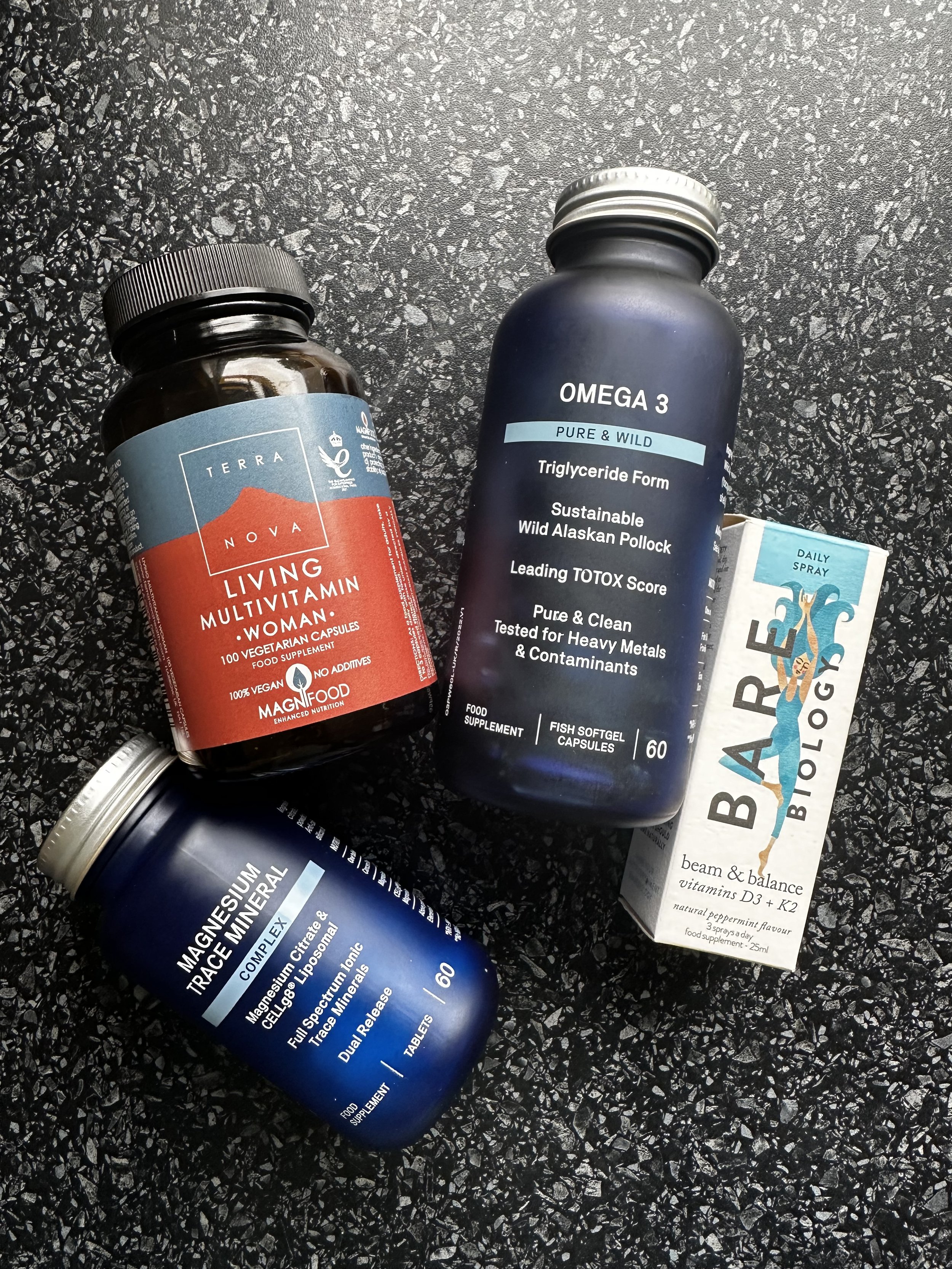The Power (and Limits) of Supplementation
With the UK supplement market estimated to be worth £1.4 billion in online retail alone, and the broader vitamin and supplement manufacturing industry valued at £1.7 billion in 2024, it’s clear that more and more people are turning to supplements to support their health. But with such a vast array of products on the market, it’s essential to navigate this landscape wisely. The truth is, not all supplements are created equal, and simply taking a pill or powder isn’t a guaranteed solution.
Targeted supplementation can be a powerful tool to fill nutrient gaps, address deficiencies, and support optimal health, but it must be done thoughtfully. Understanding the importance of therapeutic doses, choosing supplements free from unnecessary fillers, and ensuring the nutrients are in bioavailable forms are crucial steps toward making sure your supplements work for you. Let’s dive into what makes a supplement effective—and why personalisation is key to maximising their benefits.
Why Personalisation Matters
When it comes to supplementation, one size does not fit all. This is where the concept of bio-individuality comes into play. Every person has unique nutritional needs based on factors such as genetics, lifestyle, health conditions, and even gut microbiome composition. What might be beneficial for one person could be ineffective or even harmful to another.
Bio-Individuality
Bio-individuality recognises that our bodies are all unique and, therefore, have different requirements. Factors like age, activity levels, and stress can change our nutrient needs, but it goes even deeper than that. Genetics play a significant role, influencing how we metabolise and absorb different nutrients. Even gut health can dictate how well we extract and use the nutrients from both food and supplements. For example, someone with a gut microbiome imbalance may struggle to absorb essential vitamins and minerals, no matter how nutrient-dense their diet is.
Genetic Variations (SNPs)
A key factor in bio-individuality is the presence of genetic variations, known as single nucleotide polymorphisms (SNPs), which can affect nutrient metabolism and receptor function. For example, some individuals particularly those with darker melanin tones, or with known SNPs that make their Vitamin D receptors less efficient, meaning they need adjust their doses of Vitamin D to maintain optimal levels. Other SNPs can affect how well the body processes folate or Vitamin B12, requiring those individuals to take methylated forms of these vitamins for better absorption.
This is why functional testing can be so valuable. It helps pinpoint specific nutrient deficiencies and allows for a tailored supplement plan that addresses your unique needs, rather than guessing or following generic guidelines.
Therapeutic Doses: More Than Just the RDA
Not all supplement dosages are created equal. Recommended Daily Allowances (RDAs) are general guidelines set to prevent nutrient deficiencies in the average person, but they may not be sufficient to address specific health concerns or replenish depleted nutrient stores. This is where the concept of therapeutic doses comes in.
Distinguishing RDAs from Therapeutic Doses
The RDA is designed to meet the basic nutritional needs of the general population, but it doesn’t account for increased demands during times of stress, illness, or other specific conditions. Therapeutic doses are often higher than the RDA and are used to target specific health issues, such as magnesium for muscle cramps or higher doses of Vitamin D to combat deficiency. For example, while the RDA for Vitamin D is around 400-800 IU, therapeutic doses might be 1,000+ IU or more, depending on individual needs.
Regularly testing of some key nutrient levels ensures that you’re dosing appropriately and can help prevent both deficiencies and toxicity. Nutrients like Vitamin D and iron are particularly important to monitor. Testing your Vitamin D levels at the end of summer and the beginning of spring can help you adjust your dosage to maintain healthy levels throughout the year. For iron, testing helps ensure you’re not over-supplementing, as excess iron can act as a pro-oxidant, leading to oxidative stress. Always use testing to guide your supplementation choices, rather than relying on guesswork.
Test, don’t guess!
The Importance of Consulting a Healthcare Professional
Determining the right therapeutic dose requires a personalised assessment and should be guided by a qualified healthcare provider. This is particularly important for those with underlying health conditions or individuals taking medications, as certain supplements can interact with these treatments. For instance, while higher doses of omega-3 fatty acids can be beneficial, they may need to be adjusted if you are on blood-thinning medication. Always consult with a professional before making significant changes to your supplement regimen.
Bioavailability: Making Sure Your Body Can Use It
Even if a supplement has the right ingredients, it’s useless if your body can’t absorb them effectively. This is where bioavailability becomes critical—essentially, how well and quickly your body can absorb and use the nutrients from the supplement. Here are some factors that influence bioavailability:
Nutrient Form: Different forms of the same nutrient can have vastly different absorption rates. For example:
Vitamin D3 (cholecalciferol) is much more bioavailable than Vitamin D2 (ergocalciferol), meaning your body can use it more effectively.
Methylated B vitamins (like methylcobalamin for B12) are more readily absorbed, especially in people with genetic variations that make it difficult to process standard forms.
Where applicable always look for supplements that provide bioavailable forms of the nutrients to ensure your body gets the most benefit.
Other Nutrients and Food Components:The presence of certain nutrients can enhance or inhibit the absorption of others. For instance:
Vitamin D absorption is improved when paired with Vitamin K2, which helps direct calcium to bones rather than soft tissues.
Iron is more effectively absorbed when taken with Vitamin C, which can increase iron uptake from plant-based foods. However, calcium can inhibit iron absorption, so it’s best to avoid taking these two together.
Gut Health: Your gut microbiome plays a vital role in nutrient absorption. A healthy gut with a balanced microbiome will be more efficient at extracting and absorbing nutrients. Conversely, issues like low stomach acid for example can impair nutrient uptake of nutrients such as iron and VB12, making supplementation less effective.
Medications: Some medications can interfere with nutrient absorption, leading to deficiencies.
Avoiding Harmful Fillers: Choose Clean Supplements
When it comes to supplements, it’s not just the active ingredients that matter. The excipients—the fillers, binders, and stabilisers used during manufacturing—can also affect the quality and safety of the product.
The Purpose of Excipients
Excipients are added for various reasons, such as to bind ingredients together, improve stability, or make the supplement easier to swallow. While some are necessary, others are mainly used to reduce production costs and can pose potential health risks. Understanding what to avoid is key to choosing clean, high-quality supplements.
Capsule Shells Capsules are often made from gelatine (animal-derived) or plant cellulose (vegan-friendly). These shells are necessary for holding the ingredients together but offer no nutritional benefit. Choose the type of capsule that aligns with your dietary preferences.
Fillers to Look Out for
Here are some excipients and fillers you should look out for:
Maltodextrin: Often used as a filler, maltodextrin can spike blood sugar levels, making it unsuitable for individuals with insulin resistance or diabetes. It also has a high glycaemic index, which can contribute to weight gain.
Artificial Colours and Flavours: Synthetic additives can have potential health risks, including allergic reactions and hyperactivity in children. Choose supplements that use natural alternatives like beet extract, turmeric, or riboflavin.
Artificial Sweeteners: While they make supplements taste better, artificial sweeteners can disrupt the gut microbiome and have been linked to various health concerns. Opt for supplements that use natural sweeteners like glycerine where possible.
When choosing supplements, aim for products with minimal and essential excipients. Read the labels carefully, and don’t be afraid to ask the manufacturer about their sourcing and production practices.
The Supplements I Take Going Into Winter
As the colder months set in, I adjust my supplement regimen to ensure I’m supporting my body’s changing needs. Here’s what I’m focusing on:
Supplements I Take Going Into Winter
Vitamin D3/K2 (dosing required)
Since my skin tone produces less Vitamin D naturally and I have genetic factors that affect my Vitamin D receptor meaning I do not absorb it well. As a result, I need to be mindful of my intake and adjust my dosing for my needs.
Benefits:
Supports insulin sensitivity
Supports immune function and helps fight off infections.
Promotes bone health by ensuring proper calcium utilisation.
Magnesium (approx. 200-400 mg)
I choose this form of magnesium for its high absorption and calming effects. Magnesium is involved in hundreds of biochemical reactions in the body and is particularly important for stress management, muscle function, blood sugar regulation, and sleep.Benefits:
Helps to reduce stress and supports a healthy response to anxiety.
Improves sleep quality by promoting relaxation.
Aids in muscle recovery and reduces cramps.
Omega-3 Fish Oil (as directed)
A high-quality omega-3 fish oil is part of my routine to manage inflammation and support brain health. The fatty acids EPA and DHA are essential for cognitive function, cardiovascular health, and joint mobility.Benefits:
Provides anti-inflammatory support.
Supports brain function and mental clarity.
Promotes insulin sensitivity via GLUT4 glucose transporter
High-Quality Women’s Multivitamin (as directed)
I take a comprehensive women’s multivitamin that includes methylated B vitamins and bioavailable forms of iron that are gentle and absorb well, along other essential minerals and vitamins in food state. This helps cover any potential gaps in my diet, supports energy production, and balances hormonal health. Choosing one with bioavailable forms of vitamins ensures that my body can absorb and use these nutrients effectively.Benefits:
Supports energy levels by aiding in the metabolism of food into energy.
Helps maintain hormonal balance and supports thyroid and adrenal health.
Provides antioxidants that protect cells from damage and support the body’s natural detoxification processes.
Making Smart Supplement Choices
The key takeaway here is that supplements can provide tremendous support when used correctly, but should always be tailored to your needs. Testing, understanding therapeutic doses, and choosing supplements free from unnecessary additives supports maximising their benefits. Always aim for a food-first approach, then use supplements strategically to fill gaps.
If you’re unsure where to start with your supplementation, it’s always best to seek personalised advice from your healthcare provider.
And remember—supplements should complement a nutrient-rich diet and healthy lifestyle.
Share your thoughts or questions in the comments!
Or better yet, book yourself in for a complimentary mini-consultation to discuss your supplement choices further.
References
Barbagallo, M. & Dominguez, LJ. (2015). ‘Magnesium and type 2 diabetes’. World journal of diabetes. 6(10). 1152–1157
Depeint, F., Bruce, W.R., Shangari, N., Mehta, R. and O’Brien, P.J., 2006. Mitochondrial function and toxicity: role of the B vitamin family on mitochondrial energy metabolism. Chemico-biological interactions, 163(1-2), pp.94-112.
Dai, Q., Zhu, X., Manson, J.E., Song, Y., Li, X., Franke, A.A., Costello, R.B., Rosanoff, A., Nian, H., Fan, L. and Murff, H., 2018. Magnesium status and supplementation influence vitamin D status and metabolism: results from a randomized trial. The American journal of clinical nutrition, 108(6), pp.1249-1258.
Lepretti, M. Martucciello, S. Burgos Aceves, MA. Putti, R. et al. (2018). ‘Omega-3 Fatty Acids and Insulin Resistance: Focus on the Regulation of Mitochondria and Endoplasmic Reticulum Stress’. Nutrients.10(3). 350


